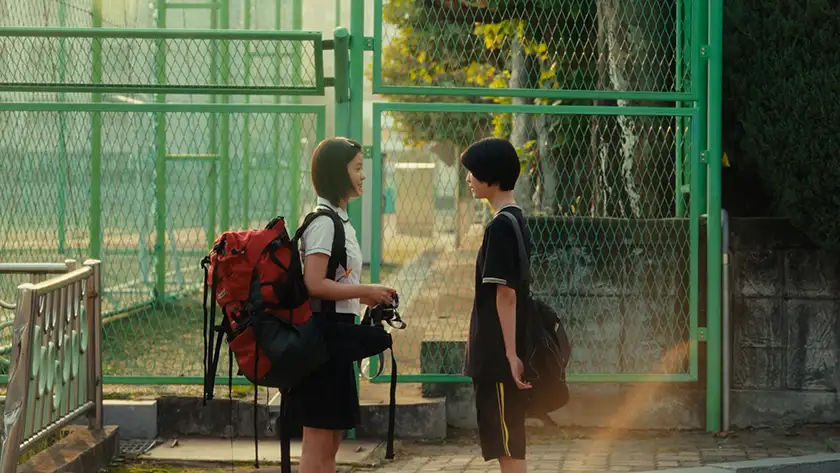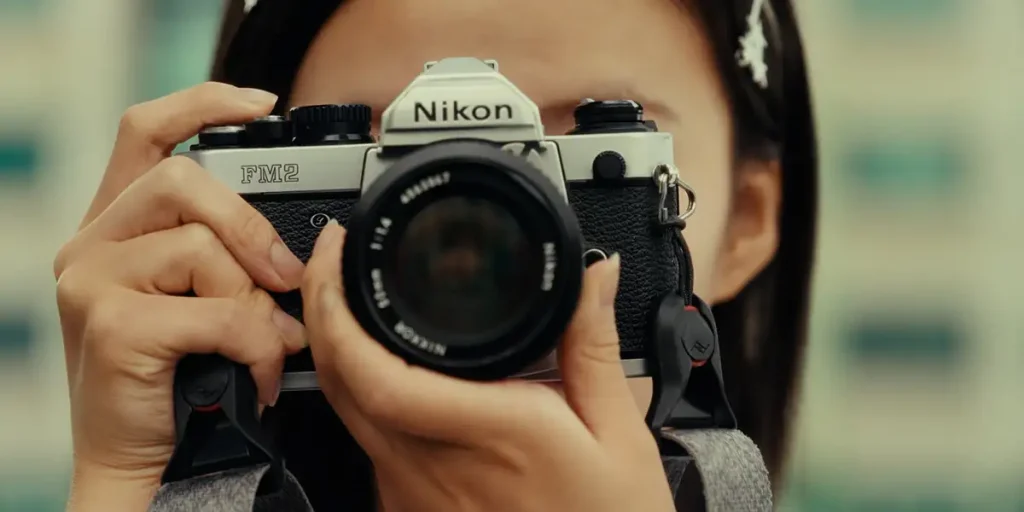Kim Sia is wonderful in Summer’s Camera, Divine Sung’s gorgeously tender debut about a young photographer falling in love whilst discovering a family secret.
Writer and Director: Divine Sung
Genre: Drama
Run Time: 82′
BFI Flare Screening: March 24-25, 2025
Release Date: TBA
When Summer (Kim Sia) was younger, she got a disposable camera. Her father also had one as a child and like him, Summer became passionate about photography. When she joined middle school, Dad gave her his compact film camera. Now she’s in high school – but he’s no longer here, having died the year prior in a road accident.
“With him gone, I don’t think I can bring myself to take those last four shots left on the roll,” she says in voiceover, preferring to keep the lens cap on her dad’s Nikon camera. However, everything changes with the whoosh of a football. That allows Summer to meet her school’s soccer star Joo Yeonwoo (Yu Gaeun) and become transfixed, using those last bits of film on pictures of her.
The two are worlds apart. Summer is more inward and reserved, and Yeonwoo is so popular she needs people to help carry her birthday presents home. But they soon start going out with each other. Meanwhile, after Yeonwoo asks for those photos of her, Summer gets the roll of film developed. That roll also includes photos taken by her father – some of which are of a figure only identified by a name tag: Doo Maru (Kwak Mingkyu). Who is he? And why did Summer’s dad – who normally never did portraits – take so many photos of him? The mystery takes her to Maru, who is now a hairdresser – and to a secret she never knew.
That is the set-up to Summer’s Camera, the wistful first feature from South Korean director Divine Sung. Like how Sophie in Charlotte Wells’ still-outstanding Aftersun uses MiniDV camcorder footage to rekindle memories of a lost parent, the titular character here uses old cameras and rolls of film to delve into her father’s past and eventually retrace his steps.
It’s a film that is rather intricate about photography (there’s an extended sequence of film being loaded into a camera), but also captures its inner beauty. The opening shots are a montage of photos of nature and swing sets – Summer’s childhood memories as seen through her dad’s lens. Not all the photos are clear and by the end of the collection, the photos turn into an abstract, Rothko-style blending of colours. But they are still simple and striking shots, which sums up what makes Summer’s Camera such an appealing watch.

The beauty continues over to the camerawork by DP Lee Jimin. Some shots are inventive, like when the camerawork turns 360° around Summer like a ticking clock. Others capture the streets of Seoul and the Ssangmun district. And others follow the practice of komorebi, where the sunlight peeks through the trees (just like Wim Wender’s Perfect Days, which also has a protagonist who takes analogue photos).
There are some terrific performances too, including a very promising one from Kim Sia as Summer. Her short, subtle smile before telling Maru of her undeniable crush on Yeonwoo (“Every time I bump into that girl, my heart races and I hear the shutter click”) is a wonderfully natural bit of acting. She is endearing as someone realising her own sexuality, realistically smitten as she falls harder for Yeonwoo and believable as someone still trying to cope with the loss of her father.
You do wish for a little more emotion from the film’s conclusion, and it does leave it a little bit too long to properly develop Summer’s mother Yuju (Bae Yeongran) and the grief that is raw for her as well. Nevertheless, that doesn’t diminish the soft and lively nature of Summer’s Camera. It also doesn’t diminish the fact Sung has an eye for latching simple yet effective feeling onto her characters. She captures the tentative first stages of love, where there is both awkwardness and attraction. She captures the fun energy of youth as Yeonwoo hangs out with Summer’s best friend Minjeong (Lee Eunsol). And she makes you feel the stinging hurt of rejection when Summer walks away from a failed date (or in flashbacks to Maru being ignored by Summer’s dad).
Summer’s Camera is a film of grief and where having a passion for something – soccer for Yeonwoo, photography for Summer (and her dad) – might trump your feelings for someone. It’s a gorgeous tender film of young love and heartbreak, as realised by Kim Sia’s performance and a perfect blend of digital and analogue photos, and it is a very successful debut from Sung.
Summer’s Camera: Movie Plot & Recap
Synopsis:
After her father passed away, Summer stopped taking photos. But everything changes when she falls in love with her school’s soccer star Yeonwoo. Then, as she develops a roll of film from her dad’s camera, Summer uncovers a secret she never knew about him.
Pros:
- It’s a gorgeously tender film about young love and heartbreak.
- Kim Sia’s performance as Summer is incredibly endearing and subtle – a joy to watch.
- It’s also a beautiful film to look at – Lee Jimin’s camerawork works very well alongside the beautiful photos captured on film.
Cons:
- You do wish for a little emotion from the film’s conclusion.
- The film also leaves it a little bit too long to properly develop Summer’s mother.
Summer’s Camera was screened at BFI Flare on March 24-25, 2025. Read our BFI Flare reviews and our list of 10 movies to watch at BFI Flare 2025!

